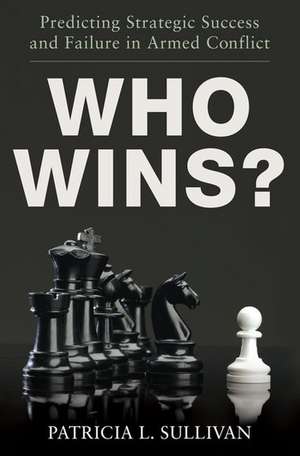Who Wins?: Predicting Strategic Success and Failure in Armed Conflict
Autor Patricia Sullivanen Limba Engleză Paperback – 26 iul 2012
| Toate formatele și edițiile | Preț | Express |
|---|---|---|
| Paperback (1) | 302.20 lei 31-37 zile | |
| Oxford University Press – 26 iul 2012 | 302.20 lei 31-37 zile | |
| Hardback (1) | 685.35 lei 31-37 zile | |
| Oxford University Press – 26 iul 2012 | 685.35 lei 31-37 zile |
Preț: 302.20 lei
Nou
Puncte Express: 453
Preț estimativ în valută:
57.84€ • 62.85$ • 48.62£
57.84€ • 62.85$ • 48.62£
Carte tipărită la comandă
Livrare economică 10-16 aprilie
Preluare comenzi: 021 569.72.76
Specificații
ISBN-13: 9780199878352
ISBN-10: 0199878358
Pagini: 192
Ilustrații: black & white line drawings, black & white tables, figures
Dimensiuni: 155 x 231 x 15 mm
Greutate: 0.23 kg
Editura: Oxford University Press
Colecția OUP USA
Locul publicării:New York, United States
ISBN-10: 0199878358
Pagini: 192
Ilustrații: black & white line drawings, black & white tables, figures
Dimensiuni: 155 x 231 x 15 mm
Greutate: 0.23 kg
Editura: Oxford University Press
Colecția OUP USA
Locul publicării:New York, United States
Recenzii
Sullivan convincingly argues that war aims of interstate-dispute initiators and internal-conflict interveners play a more determinative role in who wins an armed conflict than most factors conventionally considered... Qualitative and quantitative data provide supporting evidence, creating a good example of mixed-methods research. Sullivan writes clearly throughout, making the book accessible beyond scholars and practitioners... Sullivan has written a thought-provoking book that opens new avenues of research.
Notă biografică
Patricia L. Sullivan is Assistant Professor of Political Science and Peace, War, and Defense in the Department of Public Policy at the University of North Carolina, Chapel Hill. She is the recipient of the 2011 SPIA Excellence in Teaching Award, the 2004-2006 Walter Isard Dissertation Award, given every two years by the Peace Science Society International, and the 2005 Dissertation Award from the Committee on the Analysis of Military Operations and Strategy (CAMOS), an affiliated group of the American Political Science Association.
















